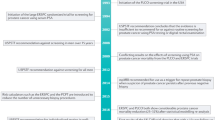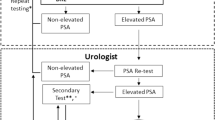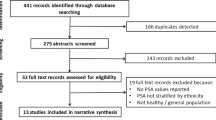Abstract
The possibility of screening the general population for prostate cancer using serum prostate-specific antigen (PSA) level (alone or in combination with other tests) as screening test has recently been discussed. A number of studies are on the way, but the published reports have almost exclusively been based on men volunteering for screening. We assessed the feasibility of a screening study based on men identified from a central population registry. A random sample of 600 men in the age groups 55, 60 and 65 years was identified from the Finnish Population Registry as the study population. Half of them were randomised to the intervention group and an invitation to participate was sent to them. The participation rate was 77% (230 out of 300). Twenty-five men had a serum PSA concentration of 4.0 micrograms l-1 or above and were invited for further examination including digital rectal examination, transrectal ultrasound and transrectal Tru-cut biopsies (directed and/or random). Six cases of cancer were detected among the 230 participating men, which corresponds to a detection rate of 2.6% and a positive predictive value of 24%. The number of cases detected is equivalent to the expected number of prostate cancer cases during a 10 year follow-up in this population. The ratio of free to total PSA was also measured and a cut-off level of 0.20 was chosen. Its use as an additional criterion of the screening test would have decreased the prevalence of false-positive screening tests from 8% (19 of 230) to 3% (7 of 230) at a cost of missing one of the six cancers compared with serum total PSA concentration alone. Of the six cancers, five were clinically regarded as localised and locally confined disease was confirmed pathologically in four of them. In conclusion, a population-based study in Finland seems feasible and the properties of the PSA test can be regarded as suitable for a randomised screening study. Thus, all prerequisites for a multicentre study, which is planned, seem to exist.
This is a preview of subscription content, access via your institution
Access options
Subscribe to this journal
Receive 24 print issues and online access
$259.00 per year
only $10.79 per issue
Buy this article
- Purchase on Springer Link
- Instant access to full article PDF
Prices may be subject to local taxes which are calculated during checkout
Similar content being viewed by others
Author information
Authors and Affiliations
Rights and permissions
About this article
Cite this article
Auvinen, A., Tammela, T., Stenman, UH. et al. Screening for prostate cancer using serum prostate-specific antigen: a randomised, population-based pilot study in Finland. Br J Cancer 74, 568–572 (1996). https://doi.org/10.1038/bjc.1996.402
Issue Date:
DOI: https://doi.org/10.1038/bjc.1996.402
This article is cited by
-
Mass screening of prostate cancer in Changchun City of China
International Urology and Nephrology (2004)



